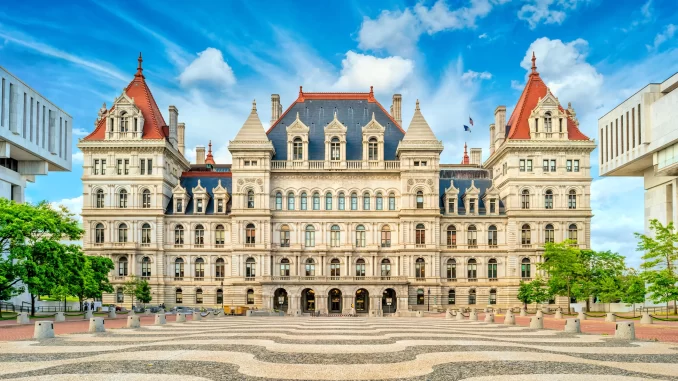
By Hank Russell
On April 15 — two weeks after the budget deadline — Governor Kathy Hochul came to a conceptual agreement on the state budget for the 2025 fiscal year. Despite this agreement, the budget has still yet to be finalized and signed off by the governor. Some local GOP state legislators also were concerned about the financial impact of the proposed budget, while others slammed the budget process as lacking in transparency.
Hochul said the proposed budget would cover key provisions such as housing, crime, mental health, healthcare, Medicaid, education, mass transit, infrastructure and the environment. “I said we would crack down on persistent crime like retail theft and the proliferation of unlicensed cannabis stores and toll evaders – we got it done,” Hochul said. “I said we’d take concrete action to address the housing crisis and make it easier for New Yorkers to find homes they can afford – we got it done. And I said we’d continue to bolster our mental health system, invest in children and families, build the economy of the future – and we got it done.”
While some of the elected officials Long Island Life & Politics reached out to did not want to comment until the budget passed, others didn’t want to wait to express their displeasure.
In a joint statement, Assembly Minority Leader Will Barclay (R,C,I-Pulaski) and Assemblyman Ed Ra (R-Franklin Square), the ranking member of the Assembly’s Ways & Means Committee, pointed out that the proposed budget would be $240 billion — the most in the state’s history. “The troubling trend with New York’s budgeting seems to be, the higher the spending number gets, the more backward the process becomes,” they stated, adding that the budget will be passed “before Gov. Hochul and Majority leaders do us the courtesy of providing a detailed financial picture.”
The biggest concern was the lack of transparency in the budget process which would have given the state legislators time to review it before a tentative budget was introduced. Assemblyman Joe DeStefano (R-Medford) said this was “deeply troubling” to him. Barclay and Ra said this backroom dealing between the governor and the Democrat majorities in the Assembly “demonstrates how dysfunctional our process has become.”
While he was pleased to see the reinstatement of Foundation Aid in the tentative budget — in the amount of $24.9 billion — and $100 million in CHIPS funding, DeStefano said he was disappointed that his bill that would increase the penalty for crimes against law enforcement, emergency medical services personnel and firefighters by designating them as hate crimes. He also did not like the “concerning provisions” that he saw in the budget.
“From misguided migrant spending to contentious policies like good cause eviction and congestion pricing, there’s a palpable disconnect between legislative priorities and the needs of New Yorkers.” DeStefano said. “And the prospect of tax hikes exacerbates the burden on residents already grappling with an affordability crisis as well as contributes to our eroding business climate.”
Ra, along with Assemblyman Josh Jensen (R,C-Greece), disagreed with the changes being made to the Consumer Directed Personal Assistance Program (CDPAP). Under the tentative budget, the state will appoint “fiscal intermediaries” who will be responsible for cracking down on fraud.
“[These] potential reforms could lead to negative outcomes for New Yorkers and their families in the disabled and elderly communities that rely on this program,” Ra and Jensen stated. “With a move to single fiscal intermediary, the state could single-handedly put small and medium-sized businesses that have been responsibly helping families for years out of business, with no guarantee of a seamless transition for consumers and caregivers by the state’s hand-picked operator.”
For Long Islanders, the proposed budget brings “little solace,” DeStefano said. “Instead, it trends on economic disenchantment. The absence of substantive measures to address pressing concerns such as affordability and public safety underscores a pattern of missed opportunities. Disillusionment with state leadership will only deepen when the specifics of the budget are unveiled.”

